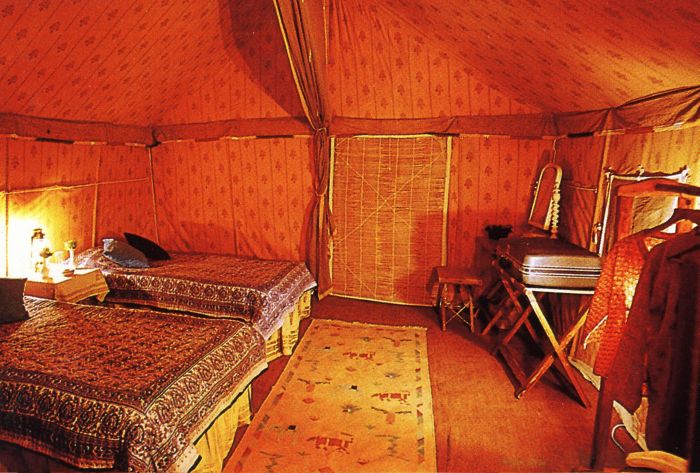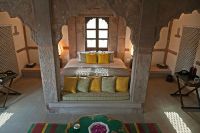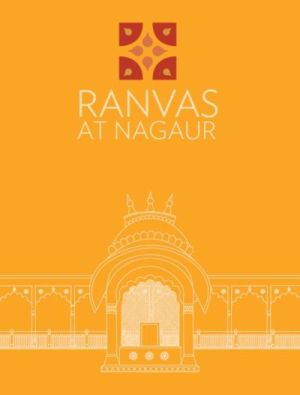
The Abode of the queens
Within the magnificent Ahhichatragarh Fort, also known as Nagaur Fort, lies the 18th century residences of the sixteen ranis of Maharaja Bakhat Singh of Jodhpur.

Part of an ambitious 20 year plan to restore the Fort, they’ve been meticulously revived to offer elegant and inviting accommodation.

Now one of the most well preserved queenly residences in India, Ranvas is a heritage property in the purest sense, giving its guests the chance to experience a living legacy and a regal residence from which to explore Ahhichatragarh.

During the 18th century, Bakhat Singh, the ruling maharaja of the time, sought to create a refuge from the external troubles of warfare and politics.

The result was a pleasure palace which, still today, awakens the senses through its art and aesthetics - from the sound of fountains and peacocks to the sight of vivid fresco paintings and perfectly constructed geometric gardens.

Each of the ten refurbished havelis has been named after one of the ranis and has two or three bedrooms with ensuite bathrooms and a private courtyard.

The suites on the first floor open on to a private terrace. At present Ranvas comprises 27 rooms in total, a swimming pool and two charming restaurants.

LEISURE
Relax by the swimming pool or in the lounge.

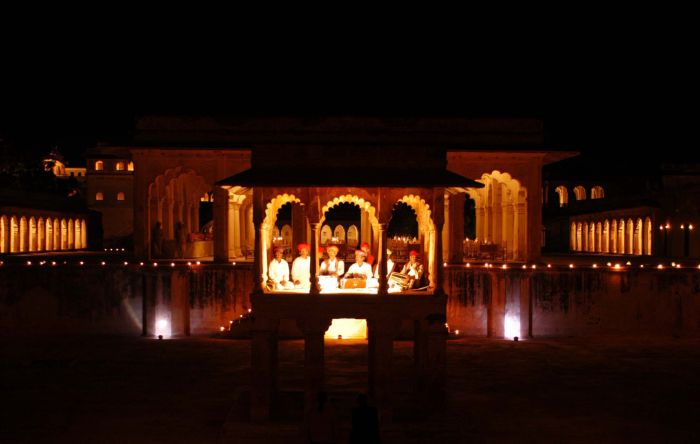

Guided tours of the museum, palaces and halls in the Ahhichitaragarh Fort reveal a fascinating history and art heritage, having been expertly restored.

Visit nearby temples, walk on the ramparts or stroll around the gardens.

Excursions to Nagaur town and the surrounding desert by camel, horse-back or car include sampling crafts at the local bazaar.

DINING
Enjoy Mughal Sufi cuisine inspired by the ranis’ kitchens and an à la carte menu served at the indoor restaurant.

The many pillared outdoor Bardari ar the all day dining pavilion and serves both Indian and world cuisine.

The indoor restaurant also functions as a conference room.

ROOMS & SUITES
There are 27 rooms spread through 10 havelis. Each haveli has two or three bedrooms with ensuite bathrooms and a private courtyard.


ROYAL TENTS
The Royal Camp at Nagaur is pitched on an old polo ground within the historic walls of the Ahichattragarh Fort, a spectacular Rajput-Mughal bastion that dates as far back as the 5th Century. The tents themselves are stylish and luxurious, with attached baths, and the surroundings; a unique complex of magnificent palaces, airy pavilions and intricate waterways; truly magical. The Emperor Akbar visited Ahichattragarh more than once and to dine at his Akbari Mahal with candlelight and live music is an experience rare even for Rajasthan.

The best time to camp in Nagaur is during the famous annual live-stock fair, second only to the Pushkar Fair; in fact, perhaps in some ways superior to Pushkar because it is as yet "unspoilt". Thousands of camels and horses, and the famed Nagori Bull, which of all the Indian strains most resembles the one on the Mohenjodaro Seal, camp around the city which becomes a veritable market those few days. It is Rajasthan at its best and brightest.
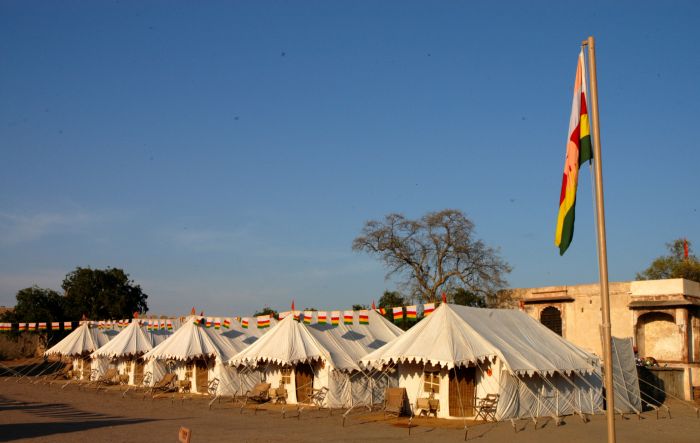
The fair takes place sometime in January/February, the exact date ascertained by the Indian lunar calendar (see table below).
Monuments Nagaur is an extremely interesting little township with innumerable monuments tucked away in its charming streets and lanes. There are some lovely old Mughal mosques and the cenotaph of Amar Singh Rathore, who lived in Ahichattragarh and dared to defy the Emperor Shah Jahan himself, is a must see.

The Country The Royal Camp in Ahichattragarh makes an ideal base to explore the surrounding country. It is a land best seen on camel; rolling scrub, the occasional group of sand dunes and the rarer little lake, brilliant yellow mustard fields, herds of wild Chinkara (Indian Gazelle) and Black-Buck (Indian Antelope), glorious sun-sets...
